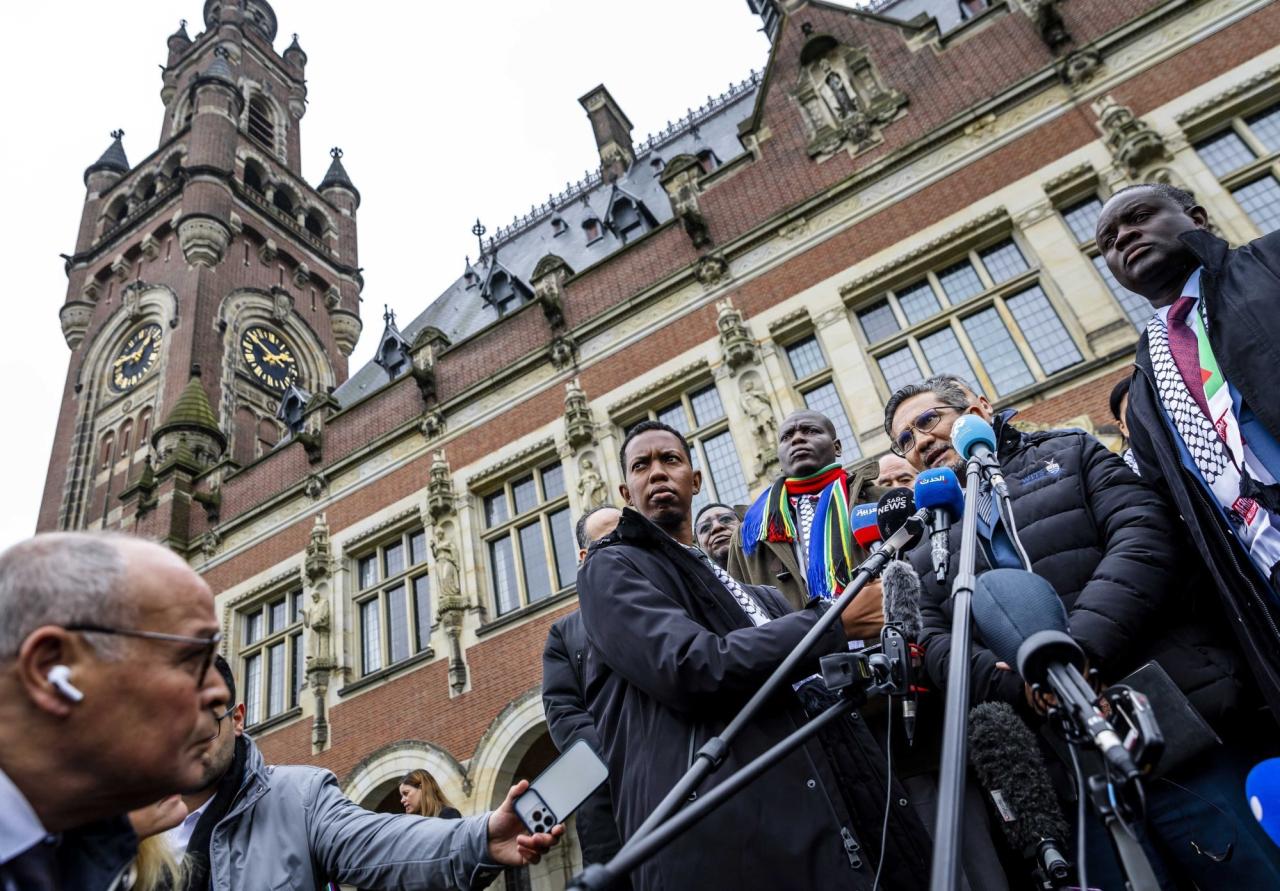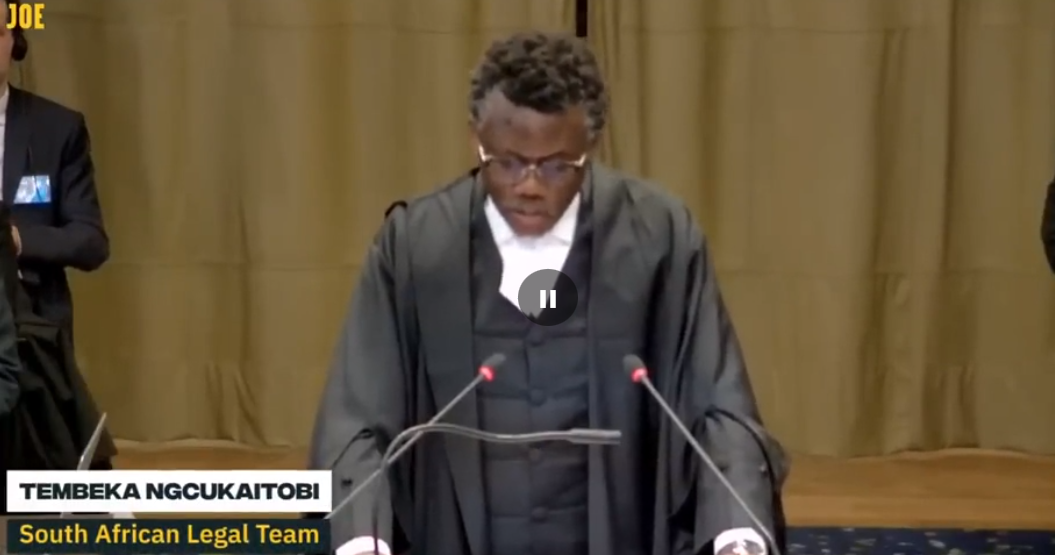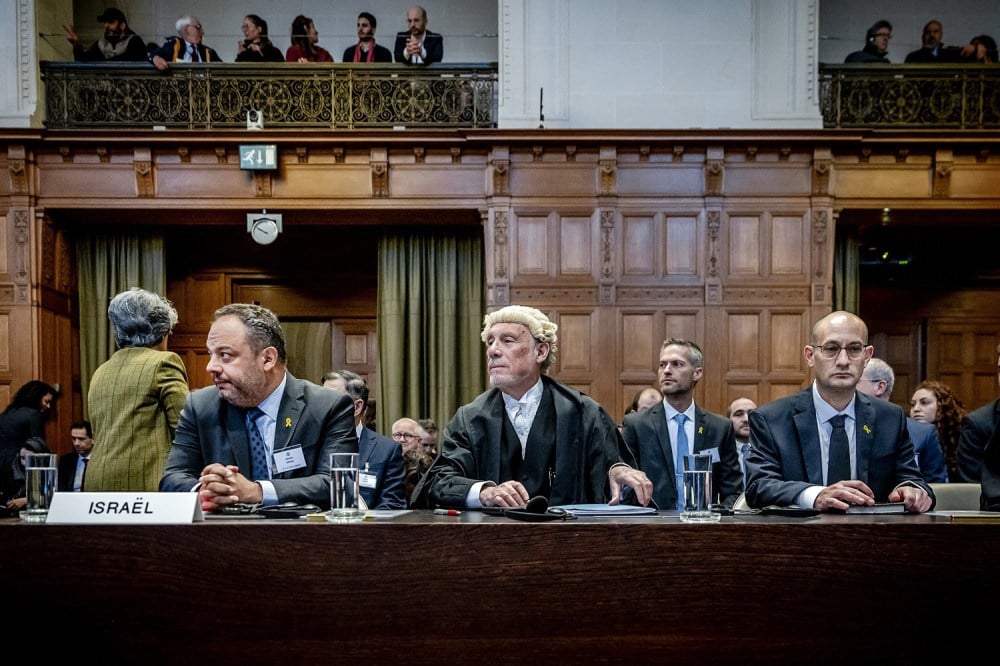
ICJ South Africa Palestine Israel UN Court A Deep Dive
ICJ South Africa Palestinian Israel UN Court: Examining the complex interplay of international law, politics, and history in this critical geopolitical arena. The court’s potential role in resolving the Israeli-Palestinian conflict, South Africa’s involvement, and the UN’s historical resolutions all contribute to a multifaceted narrative. This exploration delves into the intricacies of this ongoing dispute, from historical context to potential outcomes.
The Israeli-Palestinian conflict is a deeply rooted struggle with profound implications for the international community. This analysis will explore the historical context, the role of the International Court of Justice (ICJ), and the key players involved, including South Africa and the United Nations. We will examine the legal arguments, potential outcomes, and the wider impact on international relations.
A crucial component will be understanding the historical precedents and the role of international law.
Historical Context
The Israeli-Palestinian conflict, a deeply rooted and complex struggle, has its origins in the historical and political landscape of the Middle East. Centuries of competing claims and narratives intertwine with modern geopolitical forces, making a simple resolution elusive. Understanding this history is crucial to comprehending the current challenges and the role of international bodies in addressing them.
A Concise History of the Israeli-Palestinian Conflict
The conflict’s roots stretch back to the late 19th and early 20th centuries with the rise of Zionist movements advocating for a Jewish homeland in Palestine, a region inhabited by a predominantly Arab population. The British Mandate for Palestine, established after World War I, further complicated the situation, as conflicting aspirations for the land clashed. The 1947 UN Partition Plan, intended to divide the territory into separate Arab and Jewish states, was rejected by Arab leaders and led to the 1948 Arab-Israeli War.
This war resulted in displacement and conflict that continues to shape the region. Subsequent wars, including the Six-Day War and the Yom Kippur War, further solidified the divisions and entrenched the territorial disputes. The ongoing occupation of Palestinian territories, settlements, and the issue of Palestinian refugees, continue to fuel the conflict.
The Involvement of the UN in the Conflict
The United Nations played a crucial role in attempting to mediate the conflict. The 1947 UN Partition Plan, while controversial, was a significant attempt to resolve the competing claims to the land. The UN Relief and Works Agency for Palestine Refugees in the Near East (UNRWA) was established to address the needs of displaced Palestinians. Various UN resolutions have condemned Israeli actions and urged for a two-state solution.
The ICJ ruling in South Africa regarding the Palestinian-Israeli conflict at the UN court is definitely a hot topic. It’s complex stuff, and honestly, sometimes navigating these international legal battles feels like wading through mud. While the complexities of the ICJ case are quite heavy, I’ve found some comfort in reflecting on the human side of things, like with articles exploring grief, for instance, grief is for people sloane crosley.
It’s a reminder that behind these political disagreements, there are people suffering, and their experiences deserve consideration. Ultimately, though, the ICJ’s role in this ongoing dispute remains crucial in finding a path towards a peaceful resolution.
However, the UN’s efforts have been often met with limited success due to the deep-seated political divisions and the lack of agreement between the involved parties.
The Establishment and Evolution of the International Court of Justice (ICJ)
The International Court of Justice (ICJ), the principal judicial organ of the United Nations, was established in 1945. Its role is to settle legal disputes submitted to it by states and to give advisory opinions on legal questions referred to it by authorized UN organs. The ICJ’s jurisdiction is based on the consent of states involved in a dispute.
The ICJ has evolved from a relatively new institution to a vital component in international legal discourse, resolving disputes and contributing to the development of international law. Its decisions, while not always binding, can have a significant impact on the behavior of states and the course of international relations.
Historical Precedents of Similar Legal Disputes
Numerous legal disputes involving international bodies, such as the Permanent Court of International Justice, preceded the ICJ’s involvement in the Israeli-Palestinian conflict. These earlier cases, often related to border disputes, territorial claims, and human rights violations, set precedents and established legal principles that have influenced the ICJ’s approach to similar issues in the future. Understanding these precedents provides context for evaluating the ICJ’s decisions and their impact on the Israeli-Palestinian conflict.
Comparison of Key Dates and Events
| Date | Event | ICJ Involvement | UN Involvement |
|---|---|---|---|
| 1947 | UN Partition Plan | None | Significant |
| 1948 | Arab-Israeli War | None | Mediation attempts |
| 1967 | Six-Day War | None | Condemnations |
| 2004 | Advisory Opinion on the Wall | Provided Opinion | Background to the case |
| 2022 | Ongoing ICJ proceedings | Active | Continued involvement in negotiations and monitoring |
ICJ Role and Jurisdiction
The International Court of Justice (ICJ) plays a crucial role in resolving international legal disputes. Established by the United Nations Charter, it serves as the principal judicial organ of the UN, tasked with settling legal disputes submitted to it by states. Its jurisdiction is defined by treaties and agreements, making its role in specific conflicts like the Israeli-Palestinian one, contingent on the consent of the involved parties.The ICJ’s authority stems from its mandate to apply international law, including customary international law, treaties, and general principles of law, to disputes brought before it.
However, its ability to effectively address complex conflicts like the Israeli-Palestinian one is often limited by the political realities and the willingness of the parties to cooperate.
Jurisdiction of the ICJ in International Disputes
The ICJ’s jurisdiction is based on the consent of states. This consent can be expressed through treaties or special agreements (compromissory clauses) where states explicitly agree to submit particular disputes to the Court’s judgment. In the absence of such consent, the Court lacks jurisdiction to hear the case. This principle is fundamental to the Court’s role in maintaining international peace and security.
Cases Related to the Israeli-Palestinian Conflict
The ICJ has not directly addressed the core issue of the Israeli-Palestinian conflict, regarding the status of Jerusalem or the final status of the territory, due to the lack of consent from the involved parties. However, the Court has dealt with related issues in the past. These cases often involve claims of violations of international humanitarian law, such as in situations of occupation or human rights abuses.
The ICJ ruling in South Africa regarding the Palestinian-Israeli conflict at the UN court is a fascinating case, but it’s also pretty complex. It’s easy to get lost in the legal minutiae, but it’s also interesting to consider how these geopolitical issues are reflected in broader cultural discussions. For example, the recent analysis of Taylor Swift’s music in the “Tortured Poets Department Taylor Swift A Deep Dive” blog post Tortured Poets Department Taylor Swift A Deep Dive reveals how seemingly personal struggles can mirror larger societal tensions.
Ultimately, the ICJ case highlights the ongoing need for diplomacy and understanding in resolving these sensitive international disputes.
The Court’s role in the region is limited to situations where the parties have agreed to submit disputes to its jurisdiction.
Legal Basis for ICJ Involvement
The legal basis for ICJ involvement relies on the principle of state consent. If Israel and Palestine, or other parties involved, have agreed to submit specific disputes to the Court’s jurisdiction through a treaty or agreement, the Court has the legal authority to hear the case. This consent is essential for the ICJ to exercise its authority legitimately.
This involves not only the parties involved but also potential third-party involvement.
Limitations of ICJ’s Authority
The ICJ’s authority is limited by the political realities of the situation. The parties may not be willing to cooperate with the Court, or their actions might not be aligned with the Court’s judgment. Enforcement of ICJ rulings is not automatic and relies on the cooperation of the involved states. The Court’s judgments are legally binding on the parties to the dispute, but there is no mechanism to enforce them if a state refuses to comply.
This has been a recurring challenge in international law.
Implementation and Challenges to ICJ Rulings
The implementation of ICJ rulings is dependent on the willingness of the involved states to comply. If a state does not comply, there is no automatic enforcement mechanism, and the Court’s authority can be undermined. The Court’s ability to influence the situation is thus constrained by political factors and the capacity of states to adhere to international legal obligations.
The ICJ ruling on South Africa’s role in the Palestinian-Israeli conflict at the UN court is definitely a hot topic right now. It’s all connected to the current situation, including the recent Biden administration’s efforts towards an Israel-Hamas cease-fire, like this one. Ultimately, the ICJ’s involvement in the situation highlights the complex diplomatic and legal challenges involved in the region.
The court has made important rulings in the past, but their practical impact has varied depending on the political context.
The ICJ ruling on South Africa, Palestine, and Israel in the UN court case is definitely sparking debate. It’s fascinating how these international legal battles unfold, and the complexities of these situations often seem mirrored in other seemingly unrelated events, like the tragic armorer Alec Baldwin Rust shooting. Ultimately, these events highlight the ongoing struggle for justice and resolution in international affairs, and remind us how easily seemingly distant issues can be intertwined.
South African Role
South Africa’s involvement in the Israeli-Palestinian conflict has been a complex and evolving journey, marked by a commitment to peace and justice, often at odds with geopolitical pressures. The country’s position, shaped by its own historical experiences with apartheid and its desire to promote a just resolution, has consistently positioned it as a key player in international efforts to achieve a lasting peace.
This role has involved navigating a delicate balance between its moral commitments and practical considerations within the global landscape.
South Africa’s Involvement in the Conflict
South Africa has been actively engaged in mediating and advocating for a resolution to the Israeli-Palestinian conflict. This engagement has manifested in various forms, from diplomatic initiatives to statements condemning violence and advocating for a two-state solution. Its approach is grounded in the belief that a just and lasting peace requires addressing the root causes of the conflict and upholding the rights of all parties involved.
Motivations Behind South Africa’s Stance
South Africa’s stance on the Israeli-Palestinian conflict is deeply rooted in its own history of struggle against apartheid. This historical experience has instilled a strong commitment to human rights, self-determination, and the importance of resolving conflicts through peaceful means. Furthermore, the country recognizes the inherent value of international law and the role it can play in achieving a just and equitable resolution.
South Africa’s perspective aligns with its commitment to international justice and its recognition of the importance of resolving conflicts through peaceful means.
South Africa’s Relationship with the UN
South Africa has a long-standing relationship with the UN, actively participating in various UN bodies and processes related to the Israeli-Palestinian conflict. Its engagement reflects a belief in the UN’s capacity to facilitate dialogue and promote peace. This involvement is part of a broader commitment to multilateralism and the role of international institutions in addressing global challenges.
Timeline of South African Involvement
- 1990s-2000s: South Africa, having transitioned from apartheid, actively participated in UN discussions and resolutions related to the conflict, often advocating for a two-state solution. This period saw the country engaging in diplomatic efforts to promote peace and dialogue.
- 2010s-Present: Continued participation in UN bodies and initiatives. South Africa has consistently voted in favor of resolutions condemning violence and promoting Palestinian rights. South Africa’s commitment to the rights of all involved, including the rights of the Palestinians and the right of self-determination, remains a cornerstone of its approach.
Potential Influence of South African Legal Perspectives on ICJ Proceedings
South Africa’s legal tradition, informed by its experience with apartheid, is likely to shape its approach to the ICJ proceedings. Its focus on human rights, equality, and the rule of law could potentially influence the court’s interpretation of relevant legal principles and precedents. South Africa’s own legal history and principles regarding justice and fairness will undoubtedly be influential in its submissions and arguments to the court.
South African Role in the Context of UN Resolutions and ICJ Actions
South Africa’s actions are frequently aligned with UN resolutions calling for a peaceful resolution to the conflict. Its involvement is intricately linked to the UN’s broader efforts, reflecting a shared commitment to international peace and security. The UN resolutions and ICJ actions provide a framework for understanding South Africa’s role, showcasing its commitment to international law and the rights of all parties involved.
UN Involvement and Resolutions
The United Nations, a global organization dedicated to fostering peace and international cooperation, has played a crucial role in the Israeli-Palestinian conflict. Its involvement spans decades, encompassing mediation efforts, the issuing of resolutions, and the establishment of various agencies to address humanitarian needs. Understanding the UN’s actions and pronouncements is essential to comprehending the legal and political landscape surrounding the conflict.The UN’s involvement in the Israeli-Palestinian conflict has been multifaceted, encompassing peacekeeping operations, humanitarian aid, and the articulation of positions through resolutions.
The organization’s efforts to mediate a peaceful resolution have faced significant challenges due to the deeply entrenched political positions of both sides. Analyzing UN resolutions reveals a complex interplay of perspectives and intentions, highlighting the challenges in achieving lasting peace in the region.
UN Mediation Efforts
The UN has consistently attempted to mediate the conflict, deploying various envoys and special representatives. These efforts have aimed to facilitate dialogue and negotiation between Israelis and Palestinians. Despite these endeavors, sustained peace has proven elusive, highlighting the complexity of the underlying issues. The UN’s role in mediation is often crucial, but its effectiveness is limited by the political will of the involved parties.
UN Security Council Resolutions
The UN Security Council, mandated to maintain international peace and security, has issued numerous resolutions related to the Israeli-Palestinian conflict. These resolutions address various aspects of the conflict, including the establishment of a Palestinian state, the demarcation of borders, and the resolution of humanitarian issues. The Council’s resolutions often reflect the delicate balance of power and geopolitical considerations involved.
- Resolution 242 (1967) affirms the inadmissibility of the acquisition of territory by war and calls for the withdrawal of Israeli forces from territories occupied in the recent conflict. It emphasizes the need for secure and recognized boundaries for all states in the area.
- Resolution 338 (1973) calls for a cessation of hostilities and the establishment of a framework for negotiations to achieve a peaceful resolution. It underscores the importance of the UN’s role in facilitating dialogue and conflict resolution.
UN General Assembly Resolutions
The UN General Assembly, representing the collective will of member states, has also adopted numerous resolutions addressing the Israeli-Palestinian conflict. These resolutions frequently express international support for a two-state solution and condemn acts of violence. The General Assembly resolutions often reflect the global community’s concerns regarding the conflict.
- Resolution 3236 (1974) affirms the legitimacy of the Palestinian people’s struggle for self-determination and their right to establish an independent state. It calls for the realization of the Palestinian people’s rights and emphasizes the importance of a just and lasting peace.
- Numerous resolutions condemn specific acts of violence, attacks, or human rights violations. These resolutions express the international community’s unwavering stance against violence and human rights abuses.
Comparison of UN Resolutions
The language and tone of UN resolutions vary, reflecting the nuances of the political climate and the specific issues addressed. Some resolutions are assertive and direct, while others are more nuanced and diplomatic. This variation underscores the complexities of the conflict and the different approaches to achieving a resolution.
Table of UN Resolutions, Icj south africa palestinian israel un court
| Resolution Number | Date | Key Points | ICJ Relevance |
|---|---|---|---|
| 242 | 1967 | Withdrawal from occupied territories; secure and recognized borders | Fundamental to the legal framework surrounding the conflict |
| 338 | 1973 | Cessation of hostilities; negotiations | Provides a framework for future negotiations |
| 3236 | 1974 | Palestinian self-determination; right to statehood | Highlights the international recognition of Palestinian rights |
| 478 | 1980 | Israel’s annexation of East Jerusalem illegal | Addresses the issue of territorial disputes |
Legal Arguments and Potential Outcomes
The potential ICJ case involving Israel and Palestine presents a complex legal landscape with diverse and often conflicting arguments. Understanding the legal arguments and potential outcomes is crucial to grasping the possible ramifications for the region and the international community. The case’s outcome will significantly impact the future of the Israeli-Palestinian conflict and the broader geopolitical dynamics of the Middle East.The ICJ’s jurisdiction, role, and potential ruling will be scrutinized intensely, with both sides likely employing a range of legal arguments to support their positions.
These arguments, combined with the political realities and historical context, will determine the potential outcome of the case. The impact of such a ruling on the international community, including the UN and its member states, will be substantial.
Potential Legal Arguments of Israel
Israel will likely argue that its actions are consistent with its security needs and its right to self-defense. It may cite international humanitarian law, claiming its actions are proportionate and necessary in the context of ongoing conflict. Israel may also highlight existing agreements and treaties it believes support its claims. Specific legal arguments might center on the right of self-determination for Jewish communities and the historical context of the land disputes.
Potential Legal Arguments of Palestine
Palestine will likely argue that Israel’s actions constitute violations of international humanitarian law, specifically regarding the occupation of Palestinian territories and the treatment of Palestinians. It may cite human rights violations, the destruction of Palestinian property, and the establishment of settlements as evidence of these violations. They may also argue that Israel’s actions violate international law principles of self-determination and the right of the Palestinian people to self-governance.
Potential Legal Implications of an ICJ Ruling
An ICJ ruling, regardless of its specific content, will carry significant weight in shaping the legal and political landscape. A ruling against Israel could lead to international pressure to comply, potentially including sanctions or other forms of international action. Conversely, a ruling in favor of Israel might limit the scope of international intervention. The potential implications are multifaceted, encompassing diplomatic relations, economic sanctions, and even the potential for military action, although this is less likely.
Possible Scenarios and Outcomes
The outcome of the case is unpredictable, but several scenarios are plausible. A ruling against Israel could prompt internal political pressure and international condemnation. A ruling in favor of Israel might be met with similar, but potentially different, levels of protest and condemnation, depending on the severity of the violations and the perceived fairness of the ruling. A ruling that avoids explicit blame on either side might also be possible, leaving the issues unresolved.
Historical precedent in similar cases and the political climate at the time of the ruling will strongly influence the outcome.
Ramifications on the International Community
The ICJ ruling will undoubtedly have ramifications for the international community. It could set a precedent for future disputes involving similar issues, especially regarding territorial claims and human rights violations. It will likely affect the geopolitical dynamics of the Middle East, potentially impacting relations between various countries and the overall stability of the region. The UN’s role in implementing the ruling, if any, would also be crucial.
Key Legal Arguments and Potential Impact
| Argument | Side | Potential Impact |
|---|---|---|
| Right to self-defense | Israel | May limit the scope of international condemnation if the ruling aligns with this argument. |
| Violation of international humanitarian law | Palestine | Could lead to international pressure and potentially sanctions against Israel if the ruling aligns with this argument. |
| Historical context and claims to the land | Both | May influence the interpretation of the legal arguments and the potential outcome, impacting the perceived legitimacy of both sides’ positions. |
| Human rights violations | Palestine | May increase international pressure on Israel to comply with human rights standards if the ruling highlights these violations. |
| Settlement construction | Palestine | Could be a key element in arguments regarding violations of international law. |
International Law and Principles

The Israeli-Palestinian conflict is deeply rooted in complex historical, political, and religious factors, and its resolution is intricately intertwined with international law. Understanding the relevant principles and provisions of international law is crucial to comprehending the ongoing disputes and potential avenues for peaceful resolution. This analysis delves into the key tenets of international law, highlighting their application to the conflict and the potential implications of their application.
Key Principles of International Law
International law, encompassing customary international law and treaties, establishes fundamental principles that govern relations between states. These principles underpin the rights and obligations of both Israel and Palestine. Sovereignty, territorial integrity, and self-determination are crucial principles, although their application to this specific conflict has been contentious. The principle of good faith, demanding that states act honestly and in accordance with their obligations, is equally important in resolving disputes.
International law recognizes the importance of peaceful settlement of disputes, encouraging negotiation and diplomatic solutions before resorting to force.
International Humanitarian Law (IHL)
International Humanitarian Law (IHL) governs the conduct of armed conflict, aiming to mitigate its effects on civilians and combatants. Crucially, IHL distinguishes between combatants and civilians, mandating the protection of civilians and prohibiting attacks against them. The Geneva Conventions and their Additional Protocols are central to IHL, outlining rules for the treatment of wounded and sick combatants, prisoners of war, and civilians in occupied territories.
IHL principles are applicable in situations of armed conflict, including the Israeli-Palestinian conflict, and aim to limit the suffering during times of war.
International Human Rights Law
International human rights law (IHRL) protects fundamental human rights, regardless of nationality or status. These rights, including the right to life, liberty, and security of person, the right to freedom from torture, and the right to a fair trial, are applicable to all individuals within a state’s jurisdiction. IHRL, while applicable to both states, plays a vital role in addressing issues of human rights violations during the conflict.
Ambiguities and Inconsistencies
Despite the existence of international legal frameworks, ambiguities and inconsistencies in their application to the Israeli-Palestinian conflict have emerged. Interpretations of relevant principles, such as self-determination, can vary among stakeholders, leading to disagreements and hindering a comprehensive resolution. The application of IHL in specific instances, particularly regarding the conduct of hostilities, has been a source of contention and debate.
The ICJ ruling on the South African court case regarding Palestine and Israel in the UN court is certainly a significant development. It’s fascinating how these international legal battles unfold. Meanwhile, the recent return of Anthony Kim to LIV Golf, as detailed in Anthony Kims LIV Golf Return A Detailed Look , is a compelling story on a completely different level.
It really highlights how diverse and interconnected global events can be, even though seemingly unrelated. The ICJ case, in the end, continues to shape the geopolitical landscape.
These ambiguities contribute to the ongoing challenges in achieving a just and lasting peace.
Table of International Legal Principles
| Principle | Source | Relevance to the Conflict |
|---|---|---|
| Sovereignty | Customary International Law | Relevant to the claim of statehood and the establishment of borders. Disagreements over sovereignty often arise from differing interpretations of historical claims and control over territory. |
| Territorial Integrity | Customary International Law | Concerns the inviolability of borders and the right of a state to control its own territory. Disputes over land ownership and the status of territories have been a key factor in the conflict. |
| Self-Determination | UN Charter, Declaration on the Granting of Independence to Colonial Countries and Peoples | The right of peoples to determine their own political status and pursue their economic, social, and cultural development. This principle is central to the Palestinian claim for statehood, but its application has been complicated by the existence of pre-existing settlements and claims. |
| Peaceful Settlement of Disputes | UN Charter | Obligates states to seek peaceful means to resolve disputes. The conflict has largely failed to adhere to this principle, resulting in escalation of tensions. |
| Protection of Civilians | Geneva Conventions, Additional Protocols | Ensures the protection of civilians during armed conflict. The conflict has witnessed numerous alleged violations of this principle, raising concerns about the protection of civilians. |
Public Opinion and International Relations

Public opinion plays a significant role in shaping international relations, especially in conflicts with deep historical roots and global implications. The Israeli-Palestinian conflict, a protracted dispute, has fostered diverse and often polarized views worldwide, impacting diplomatic efforts and influencing international support for either side. Understanding these sentiments is crucial for comprehending the potential outcomes of the ICJ case and its effect on global relations.
General Public Sentiment
The Israeli-Palestinian conflict evokes deeply held beliefs and strong emotional responses across the globe. Support for either side often aligns with pre-existing political and ideological stances. In many Western nations, concerns regarding human rights and the treatment of Palestinians are prominent, while in other parts of the world, historical grievances and geopolitical considerations may dominate public sentiment. This divergence in viewpoints complicates international efforts to achieve a peaceful resolution.
Influence of Public Opinion on International Relations
Public opinion significantly influences international relations by shaping public pressure on governments. This pressure can manifest in various ways, from diplomatic initiatives to boycotts and sanctions. Governments, mindful of public support, often prioritize policies aligned with prevailing public sentiment, even when those policies may not perfectly align with their own national interests or complex diplomatic strategies. The weight of public opinion can be a powerful force in international relations, affecting the actions and decisions of nations.
Potential Impacts of an ICJ Ruling on International Relations
An ICJ ruling on the Israeli-Palestinian conflict has the potential to significantly impact international relations. A decision perceived as impartial and fair by the majority of the world’s population could foster cooperation and encourage a peaceful resolution. Conversely, a ruling viewed as biased could exacerbate tensions, potentially leading to further conflict or hindering diplomatic efforts. The perception of the ruling, shaped by public opinion, will play a crucial role in its actual impact on international relations.
Analysis of Relationships Between Nations
The Israeli-Palestinian conflict involves numerous nations with varying levels of involvement and differing perspectives. Some nations strongly support Israel, citing historical ties, strategic alliances, or shared values. Others are more sympathetic to the Palestinian cause, emphasizing human rights and self-determination. The complex web of relationships among nations often involves economic, political, and security considerations, further complicating the issue.
The ICJ ruling will undoubtedly affect these complex relationships and the potential for further conflict.
Table of Perspectives on the Conflict
| Perspective | Country/Region | Key Points |
|---|---|---|
| Pro-Israel | United States, some European nations, and certain Middle Eastern countries | Historical ties, strategic alliances, concerns about Palestinian actions, and perceived threat to Israel’s security. |
| Pro-Palestine | Many Arab nations, parts of Europe, and some African nations | Emphasis on Palestinian self-determination, human rights violations, and historical injustices. |
| Neutral/Balanced | Several European countries, some Asian nations, and others | Seeking a peaceful resolution, promoting dialogue, and a commitment to international law and human rights. |
Alternative Dispute Resolution Mechanisms: Icj South Africa Palestinian Israel Un Court

The Israeli-Palestinian conflict, a deeply entrenched and complex struggle, has endured for decades. While the International Court of Justice (ICJ) and the United Nations (UN) have played crucial roles in attempting to mediate and address the issues, a resolution remains elusive. This exploration delves into alternative dispute resolution mechanisms, examining the potential of third-party mediation and other approaches to achieve a lasting peace.Alternative dispute resolution (ADR) methods, often less adversarial than traditional legal processes, can provide a pathway toward a mutually acceptable solution.
These methods prioritize dialogue, negotiation, and compromise to find common ground between conflicting parties. The specific application of ADR to the Israeli-Palestinian conflict requires careful consideration of the historical context, deeply held beliefs, and the significant political considerations.
Potential ADR Methods
Various methods of ADR, such as negotiation, mediation, and arbitration, can be employed to address the conflict. Negotiation involves direct discussion between the parties, aiming to reach a mutually acceptable agreement. Mediation utilizes a neutral third party to facilitate communication and guide the parties toward a settlement. Arbitration involves a neutral third party making a binding decision.
Role of Third-Party Mediation
A crucial aspect of ADR is the role of third-party mediation. A skilled mediator can act as a facilitator, creating a safe space for communication, helping to identify common ground, and exploring potential compromises. Mediators can assist parties in understanding each other’s perspectives and interests, which is vital for achieving a resolution. The success of mediation depends on the mediator’s neutrality, impartiality, and experience in handling complex disputes.
Examples of successful third-party mediation in other international conflicts demonstrate the potential for such processes.
Strengths and Weaknesses of Different Approaches
Different ADR methods possess varying strengths and weaknesses. Negotiation, for example, can be efficient but may not be suitable for highly entrenched conflicts where trust is absent. Mediation can foster cooperation and create a conducive environment for compromise, but it may not always result in a binding agreement. Arbitration, while offering a binding decision, may lack the flexibility to address the complex historical and emotional aspects of the conflict.
Benefits of Alternative Dispute Resolution
Alternative dispute resolution mechanisms can offer several potential benefits. These include:
- Promoting communication and understanding between the parties, which is vital for achieving a sustainable resolution.
- Maintaining flexibility and adaptability in the process, allowing for creative solutions to emerge.
- Avoiding the adversarial nature of traditional legal processes, which can often exacerbate the conflict.
- Potential for more sustainable outcomes, as they involve the parties directly in the process, promoting ownership and commitment to the agreement.
Dispute Resolution Flowchart
A flowchart outlining different dispute resolution options and their respective steps can help visualize the process:
| Dispute Resolution Option | Steps |
|---|---|
| Negotiation | Direct discussion between parties; identifying common ground; exploring potential compromises. |
| Mediation | Neutral third party facilitates communication; guides parties toward a settlement; assists in understanding each other’s perspectives. |
| Arbitration | Neutral third party makes a binding decision; formal process with defined rules and procedures. |
Final Thoughts
In conclusion, the ICJ South Africa Palestinian Israel UN Court case presents a complex and multifaceted legal and political landscape. The potential ramifications of a ruling are significant, impacting not only the parties involved but also the broader international community. Alternative dispute resolution mechanisms are also explored, offering a glimpse into potential pathways for peace and stability. Ultimately, this case highlights the challenges and complexities of international law in resolving deeply entrenched conflicts.
Frequently Asked Questions
What is the ICJ’s jurisdiction in international disputes?
The International Court of Justice (ICJ) has jurisdiction to settle legal disputes between states that have consented to its jurisdiction. This typically involves treaty-based agreements or special declarations recognizing the ICJ’s authority.
What are some potential alternative dispute resolution mechanisms for the Israeli-Palestinian conflict?
Possible alternative dispute resolution mechanisms include mediation, arbitration, and negotiation facilitated by third parties. These methods can offer more flexible approaches than traditional court proceedings.
What are some key principles of international law relevant to the conflict?
Key principles include the prohibition of the use of force, the protection of human rights, and the principle of self-determination. However, the application and interpretation of these principles often prove contentious.
What is South Africa’s role in the conflict, and what are their motivations?
South Africa’s involvement in the Israeli-Palestinian conflict is multifaceted, influenced by its own history of struggle for justice and equality. Motivations may include aligning with broader international legal and ethical principles.






